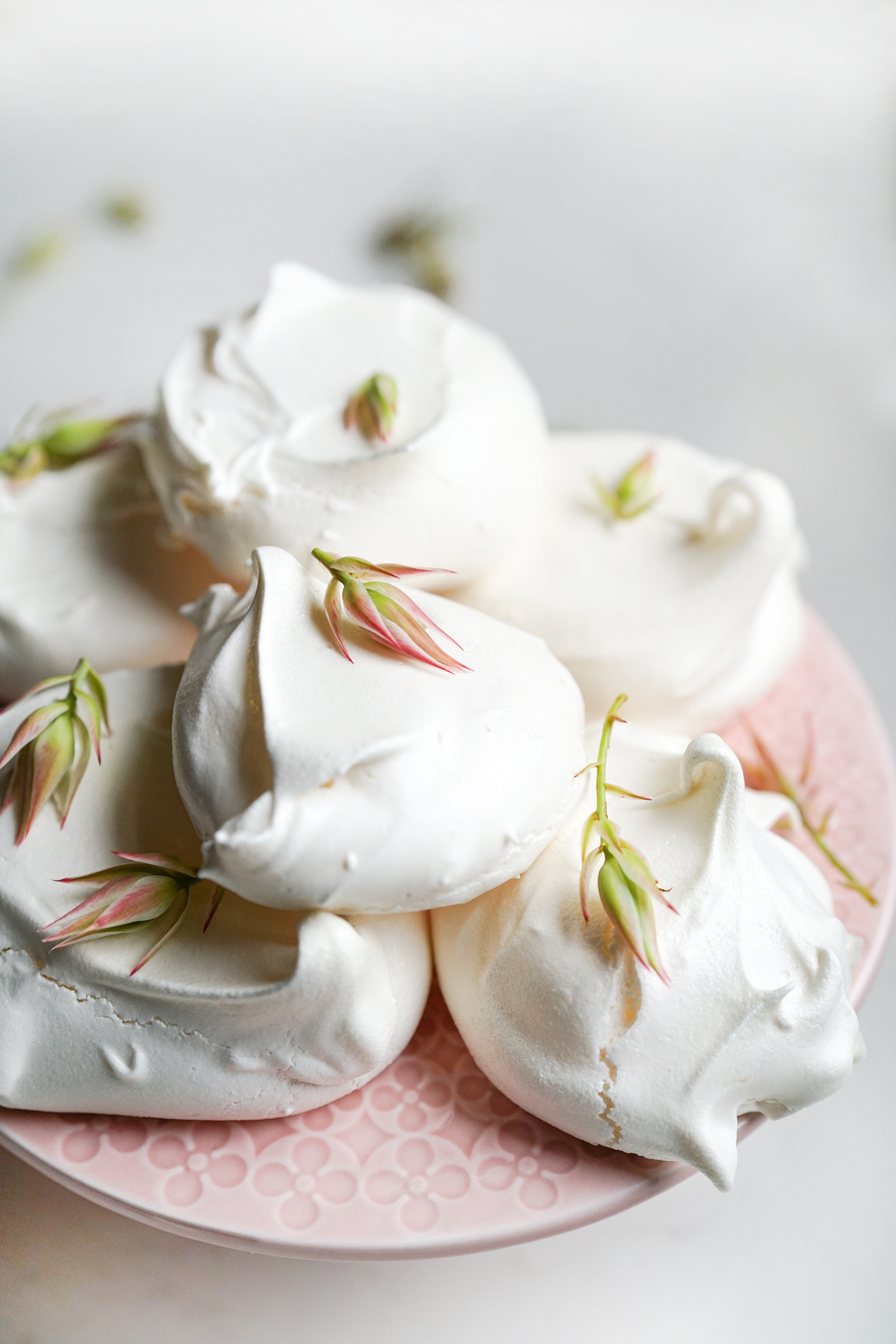
Plus, I have also updated the method – I have added more steps!!! I usually simplify recipes however this time, looking back on my old recipe, the method was WAY too simple. It worked and provided a meringue that was cheaper to make the the one below (I have basically just added 2 more egg whites, and reduced the amount of sugar slightly). What I am really trying to say is that, there are various ways to make meringues – in the ingredients, the method and the bake time. I have researched recipes and tips and tricks, and the one I have here is simple, still easy to make and the batter is smooth and silky, whilst the end result is a meringue that melts in your mouth and is gooey and chewy on the inside – the best kind of meringue if you ask me!!! YUM.
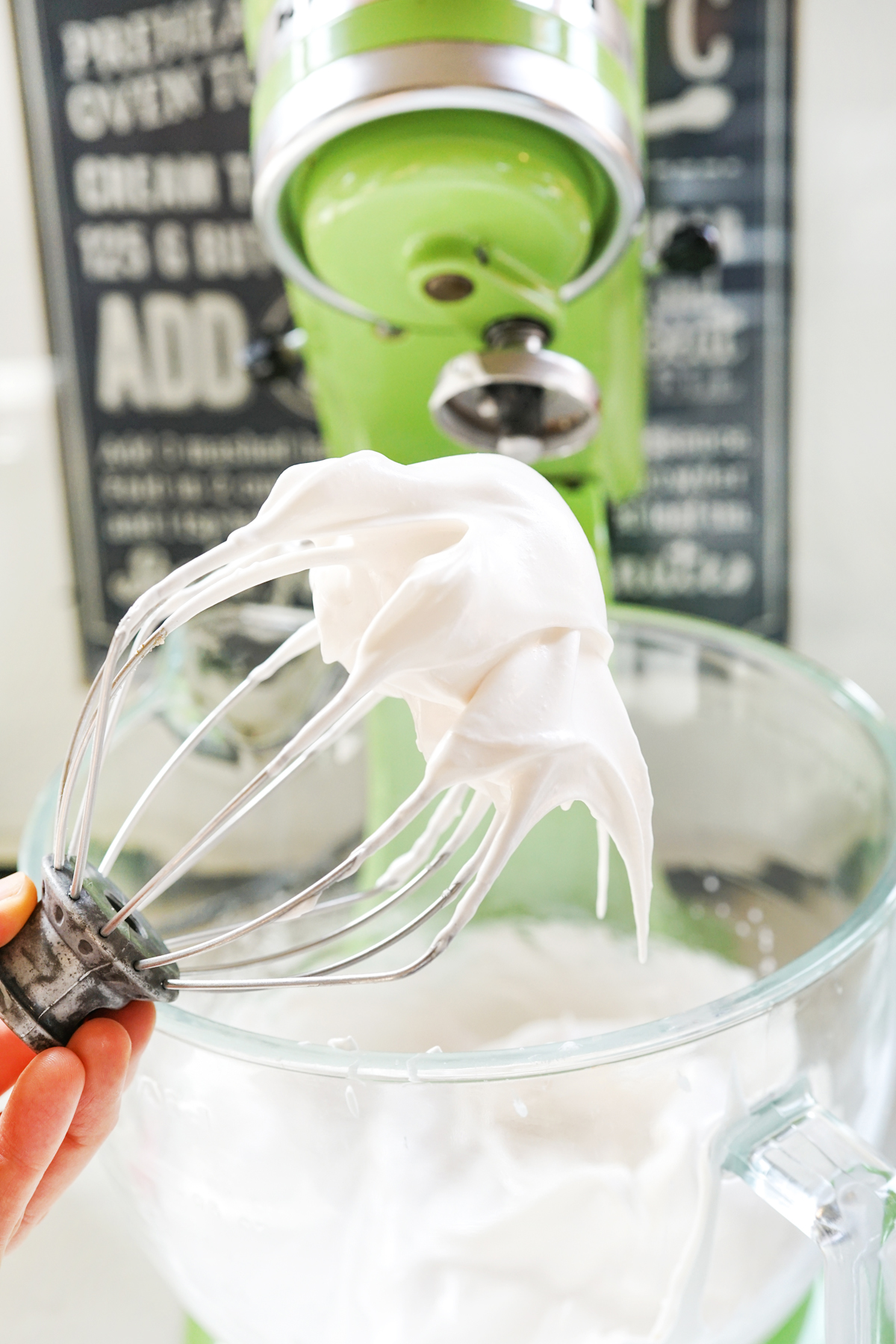
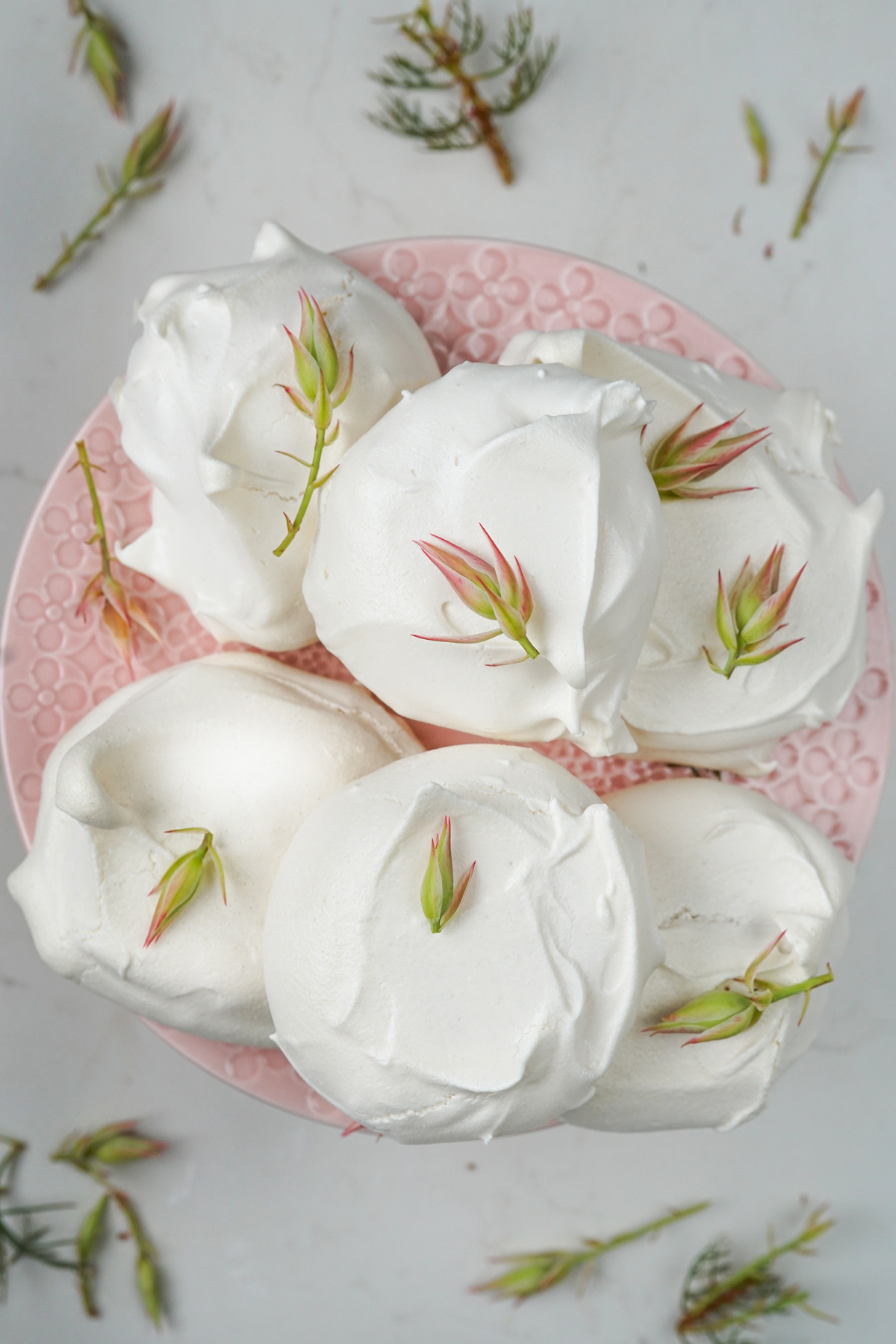
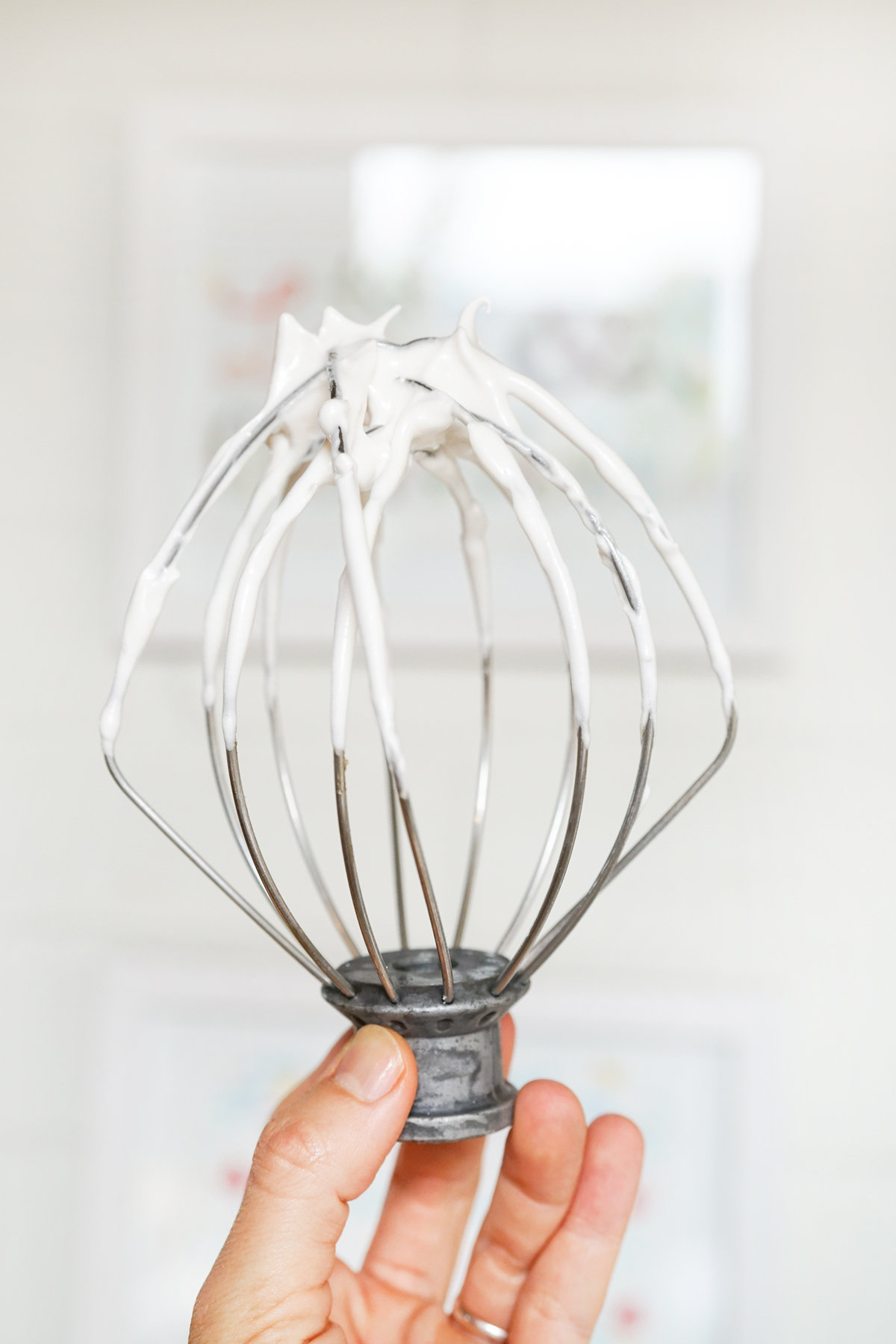
Okay so let’s take a look at some tried and tested meringue making wisdom – all the tips and tricks to make perfect meringues!
The ratio of egg white to sugar should always be 1 : 2. That was probably my most interesting discovery and the main reason I updated this recipe. The sugar stabilises the meringue and so if you were to use the meringue for a cake topping / icing, you could increase the sugar content even more to increase the stability of the icing as it would not be baked. Baking sets and stabilises meringues even further so we tend to stick to the ratio of 1 : 2 for a batter that will be baked.
Can you overwhip meringue? Yes, you can! The mixture will start to look dry, grainy and lose its shine, becoming a matte mass of meringue! They may still taste good but you will probably note that the texture isn’t 100%.
Meringues should have a smooth glossy sheen. The top tip here is to always start mixing the egg whites on a low speed with your electric mixer until the egg whites become bubbly, then increase to medium speed until soft foam peaks form. At this stage, you’ll start adding the sugar slowly one tablespoon at a time and then mixing until combined (30 -45 seconds). Keep adding the sugar and mixing until all the sugar is added. This could take 10-15 minutes and the meringue should be have a beautiful sheen to it, with stiff peaks. Stiff peaks means that when you lift the mixture out the bowl, it is not runny, the mixture is stiff enough to hold its shape.
Best Egg Whites for whipping
- Older egg whites – it sounds terrible but they are much runnier and therefore easier to whip into a foam
- Frozen and then thawed egg whites also results in runnier egg whites – perfect for egg whites. (Yes, you can store egg whites in the freezer in an airtight container for up to 12 weeks – how wonderful!!??)
- Get the egg whites to room temperature first before beating. Cold egg whites won’t produce as much of a foam as warm egg whites.
In order to stabilise the whipped meringue mixture (which is essentially a foam) before it goes into the oven, we need to add an acid. Some recipes call for cream of tartar, lemon juice or white vinegar. The recipe used here has white vinegar added.
Make sure that you use a very clean mixing bowl. Any grease of even egg yolk which contains the fats, can prevent the egg whites from foaming up to their full potential.
Shaping / Piping the Meringue
There are various ways you can shape your meringues…I used to always pipe my meringue mixture with a plain round nozzle which gives a very traditional shape. Using a star nozzle lends a more sophisticated look. Holding the nozzle quite close to the pan, squeeze out the meringue for a count of 3 and pull the nozzle away to finish it off with the wispy tail. Alternately, you can make “rustic” looking meringues as in the photos I have here where I simply dropped a few tablespoons of the mixture onto the wax paper and smoothed them with the back of a spoon. This shape suits a slighly larger meringue and the piped versions are great for smaller meringue “kisses” or if you need to pipe pavlovas.
Hard and crispy meringues result from longer cooking times, usually at lower temperatures and sometimes, more sugar in the recipe. Soft and chewy meringues, yes you guessed, have shorter cooking times and slightly higher baking temperatures and in some recipes the ratio of egg whites to sugar goes down to 1:1 – that results in an extremely soft meringue. So if you are not happy with the softness/hardness of your meringues, you can easily adjust the baking time to suit.
Lower Shelf
Place meringues on the lower shelf of the oven and keep the oven closed as meringues don’t like humidity. As a side note to that, it may be better to make meringues on less humid days.
Meringues can be stored in an airtight container for a few weeks if they are well dried – perfect for making now and eating/serving later!
Trial and Error
Making meringues is a bit of a science, as with most other recipes in the baking category, if not all. With so many variables, making meringues can be a little bit of trial and error to get the result you want. Play around with the length of baking time to get the desired hardness/softness of meringue. Also, remember that ovens do vary so this may take a little tweaking.
Types of Meringue
French Meringue – This is the one that most people are familiar with. The recipe is this post, is a typical French Meringue recipe. The egg whites are whipped until soft peaks are formed and then caster sugar is added slowly, in between mixing until stiff peaks form. It is piped into meringues kisses or cookies or shaped into a pavlova and baked.
Keen to make a Pavlova? Try out this easy Pavlova recipe which you will note has cornstarch in it (that is to help stabilise the larger base)
Economical Meringue Recipe
This meringue recipe is my old recipe and I call it economical because it has just one egg white where most meringue recipes use 3-4 egg whites to get the egg white to sugar ratio correct. This recipe still works well but will yield a harder meringue because of the large amount of sugar. Beat 1 egg white until soft peaks form, then add 1 tsp vinegar (to stabilise the foam) then add 1 cup of caster sugar but only add 1 tablespoon at a time and then mix. It is a slow process. Once you have reached stiff peaks, add 2 tbs boiling water and 1 tsp vanilla essence and mix through. Pipe into meringue shapes and bake at 125°C for 50 minutes and then allow to cool.
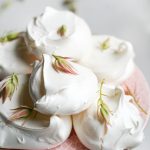
Meringues
 Prep Time: 20 mins
Prep Time: 20 mins Cook Time: 60 mins
Cook Time: 60 mins Total Time: 1h 20 mins
Total Time: 1h 20 mins Yield: 24 -30 meringues 1x
Yield: 24 -30 meringues 1x
Description
A delicious meringue recipe, tried and tested, easy to make and tips for creating the best meringues ever!
Ingredients
- 180g caster sugar (equates to 3/4 cup + 1 1/2 TBS)
- 3 egg whites (each is roughly 30g, so in total its 90g)
- 1 tsp white vinegar
- 1 tsp vanilla essence
- pinch of salt
Instructions
- Preheat the oven to 120°C
- Make sure the egg whites are at room temperature and then on slow speed on your electric mixer, start mixing until the egg whites appear bubbly.
- Increase the speed of the mixer to medium and continue beating until soft peaks form.
- Add the vinegar.
- Now start to add the sugar slowly, 1 tablespoon at a time, mixing after each addition to incorporate it into the mixture. This process can take 10-15 minutes. The main thing here is to add the sugar slowly and stop mixing once you have mixture that can hold its shape ie. stiff peaks.
- Mix in the salt and vanilla essence until combined.
- Pipe the meringues or place in spoonfuls on a wax-lined baking tray
- Bake at 120°C for 50 minutes for small meringues (add on 30 minutes if you want an extra crispy meringue) or 60 minutes for the larger “Rustic” looking meringues (add on 30 minutes if you want an extra crispy/hard meringue)
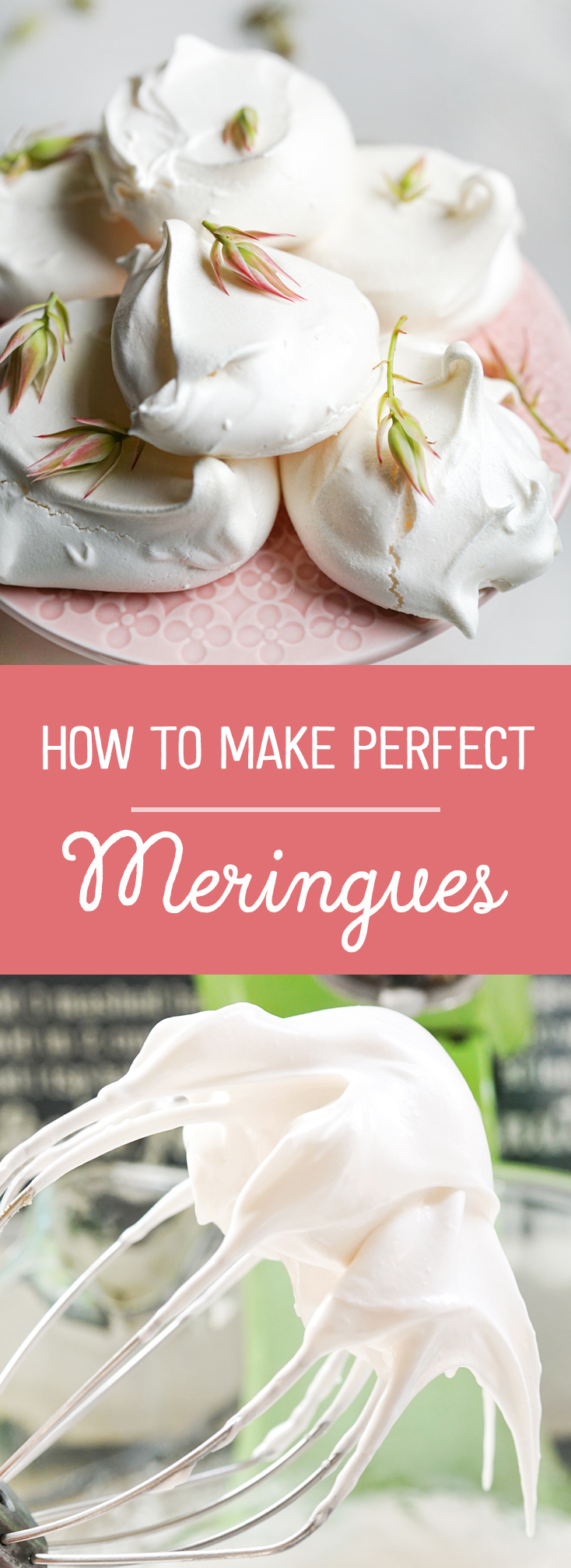



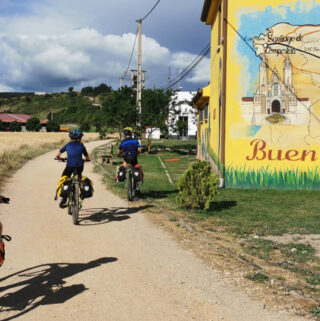

The easiest meringue recipe I have ever made. Looks and tastes amazing!
This is a fail-proof sure fire treat for kids that will never fail. Also made them for a dinner party and they complemented the fresh fruit into a Pavlova-like dessert. Fantastic. Dont be afraid to refrigerate recipe and make it over a few days, the egg white will hold for that long.
I now live in Canada. I’ve made this recipe for many many years. Just to add – after 1 hour baking (which I normally do at night for the next day- I just turn the oven off and keep the merangues in the oven till the morning. They are “never” sticky inside.
i really love this recipe,im even going to use it for my final varsity exam practical
Not to sound stupid But I am a chef and You HAVE to beat the egg white till stiff peak then GRADUALLY add castor sugar.The egg white will not rise if it is not first beaten you cant just add all ingredients together
I have always beaten the eggs and castor sugar together and have always had perfect meringues…it might not be the best way to do it but it’s the easy way 🙂
WHAT DO I USE TO GET THE SHAPE OF THE MERINGUE.
I recognised recipe I have made them for years they are delicious and easy
I RECOGNISED RECIPE IMMEDIATELY I always mixed sugar and egg white together only dif is I put my dish over bowl with hot water in and beat it well